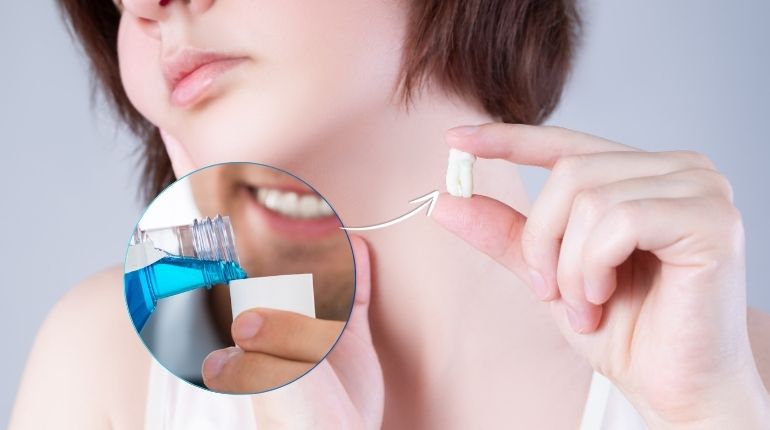


Can I Use a Mouth Cleaner After Wisdom Tooth Extraction?

Wisdom tooth extraction is a common dental procedure that many people undergo to prevent or address problems caused by these late-arriving molars. After the surgery, proper care is important to ensure a smooth and speedy recovery. One common question patients ask is whether they can use a mouth cleaner after wisdom tooth extraction. Understanding what’s safe and what’s not can make a big difference in your recovery process.
In this blog, our expert, known for wisdom tooth removal in Bistupur, shares oral hygiene's do’s and don’ts after wisdom tooth extraction, including the safe use of mouth cleaners.
Why Proper Care is Essential After Wisdom Tooth Extraction
After a wisdom tooth is removed, the area where the tooth once was needs time to heal. During this healing process, it’s important to avoid anything that could disrupt the blood clot that forms in the socket, as this clot is essential for healing. Dislodging this clot can lead to a painful condition known as a dry socket, which significantly delays the healing process.
Oral hygiene is still important during this time to prevent infection, but it needs to be managed carefully.
Using a Mouth Cleaner After Extraction: What You Need to Know
Immediate Aftercare (First 24 Hours): For the first 24 hours after your wisdom tooth extraction, it’s generally advised to avoid using any mouthwash or mouth cleaner. The mouth is in a sensitive state, and introducing any rinsing motion could disturb the blood clot at the extraction site. During this time, it’s best to focus on resting and allowing your body to begin the healing process.
When Can You Start Using a Mouth Cleaner? Typically, you can begin using a gentle mouth rinse 24 to 48 hours after the extraction, but only with your dentist’s approval. A saltwater rinse is often recommended as it helps to cleanse the mouth without being too harsh. Mix half a teaspoon of salt into a glass of warm water and gently rinse your mouth without swishing too vigorously. This can help to reduce swelling and promote healing.
Types of Mouth Cleaners to Avoid: It’s important to steer clear of commercial mouthwashes that contain alcohol during the initial recovery phase. Alcohol can irritate the extraction site and delay healing. Even after the first 48 hours, it's best to use only mild, alcohol-free mouthwashes until your dentist confirms that it’s safe to resume your normal oral hygiene routine.
How to Rinse Safely: When you start rinsing your mouth, being gentle is crucial. Avoid any vigorous swishing that could dislodge the clot. Instead, hold the rinse in your mouth for a few seconds, then let it gently pour out. Repeat this process as recommended by your dentist, usually after meals, to help keep the area clean.
Alternatives to Mouth Cleaners During the Healing Process
- Saltwater Rinse: A gentle saltwater rinse can help keep the area clean. Mix 1/2 teaspoon of salt in a glass of warm water and gently swish it in your mouth. Avoid vigorous rinsing, which can dislodge the blood clot and lead to a dry socket.
- Warm Water Rinse: If saltwater feels too harsh, you can gently rinse your mouth with warm water.
- Herbal Rinse: Chamomile tea or diluted sage tea can be used for a gentle rinse. These have natural soothing and anti-inflammatory properties.
Tips for a Smooth Recovery
- Stick to Soft Foods: For the first few days after your surgery, stick to soft foods that don’t require much chewing. This reduces the risk of disturbing the extraction site.
- Keep the Area Clean: Avoid the extraction site directly while brushing your teeth to prevent irritation. However, make sure the rest of your mouth remains clean to prevent infection.
- Follow Your Dentist’s Instructions: Always follow your dentist's aftercare instructions. If you have questions or concerns, don’t hesitate to ask for clarification.
Conclusion
In summary, using a mouth cleaner after wisdom tooth extraction can benefit your recovery, but timing and the type of cleaner matter greatly. After 24 to 48 hours, start with a gentle salt water rinse and avoid alcohol-based mouthwashes until your dentist gives the green light. Proper care and attention to oral hygiene will help ensure a smooth recovery and prevent complications like dry socket.
If you’re unsure about the right aftercare steps, especially regarding the use of mouth cleaners, schedule a consultation at Omkarananda Dental Care and Research for more information about wisdom tooth removal in Bistupur.